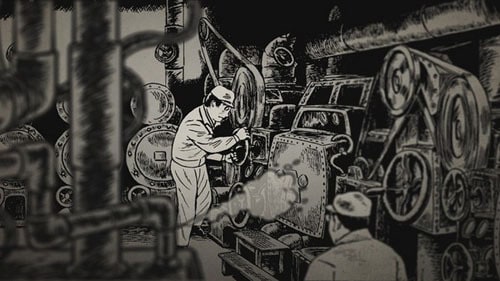 Director: Eric Khoo
Director: Eric Khoo
Based on the Autobiography & Work of: Yoshihiro Tatsumi
Starring: Tetsuya Bessho, Motoko Gollent, Yoshihiro Tatsumi
Producers: Tan Fong Cheng, Eric Khoo, Phil Mitchell, Esaf Andreas Sinaulan, Freddie Yeo
Country: Singapore
Running Time: 94 min
Year: 2011
BBFC Certificate: 15
I’m generally open to most genres when it comes to film, but there are a few that can rub me the wrong way. Romantic comedies and war movies for instance, although populated with some great titles that I cherish (e.g. When Harry Met Sally, Apocalypse Now), don’t interest me in their most generic form whereas I’ll enjoy a martial arts flick to some extent even if it’s purely by-the-numbers. One (sub) genre that I often struggle with is the biopic. Films like Ray and The Aviator for instance, although well put together, really don’t do it for me. Too often they try and cram the entirety of a person’s life into a couple of hours, which makes it feel like it’s being skimmed over, or they blow their achievements out of proportion making these people into some sort of Gods. I hate the pussy-footing around they often do too, trying to avoid a lawsuit when a personality is either alive or most of their family are. Granted some biopics are fantastic – Lawrence of Arabia could be called overblown, but admirably it questions Lawrence’s behaviour (without being preachy), avoids any tacked on love story (subtly nudging towards the rumour that he was gay) and of course it looks stunning. On a whole though, biopics are films that I generally avoid – The Iron Lady and J. Edgar are not on my radar this month for this very reason.
Which brings me to Tatsumi, which is a biopic. However, it’s a biopic with a difference. Based on Yoshihiro Tatsumi’s manga autobiography A Drifting Life and directed by Eric Khoo, Tatsumi is an animated look at the life and work of the Japanese manga artist who is thought to have started the gekiga style of alternative comics in Japan, even supposedly coining the term in 1957. Gekiga is Japanese for ‘dramatic pictures’ and is similar to the term ‘graphic novel’, when describing more adult or serious storytelling done in a ‘comic-book’ style.
What I found most interesting about the film and why I feel it is a vast improvement over most biopics is in how it’s presented. As well as being animated (which helps push a film in my favour), the film’s structure is very original. Important moments in Tatsumi’s life are told in short segments throughout the film (with a voiceover from the man himself), presented beautifully in hand-drawn animation taken straight from the style of his own work. In between these though and actually taking up most of the running time are animated versions of five of his short stories. These are mainly black and white (or sepia), with basic colour being introduced to one of the later stories (the biographical sections are all in full colour).
The stories include ‘Hell’, looking at a photographer’s guilt after capitalising on the death of a woman and daughter in the bombing of Hiroshima. Next up is the bleak (not that the other stories are cheerful) ‘Beloved Monkey’, about a lonely factory worker and his pet monkey. ‘Just a Man’ is about the frustrations of a man approaching retirement who resents his wife and looks to have an affair to spite her. ‘Occupied’ tells the story of a failing children’s manga writer who is sexually frustrated and becomes obsessed with the lewd drawings in a public toilet. The final story is ‘Good-Bye’, a WWII set tale that tells of the relationship between a drunken old man and his daughter who has turned to prostitution in answer to the humiliation of the war.
In terms of Tatsumi’s life we learn of the difficult relationship he had with his brother and father, his admiration for Osamu Tezuka and his frustration at manga being initially seen as a literary format purely for children, resulting in his pushing forward of the gekiga style.
Although the short stories are quite bleak and the autobiographical segments are more snapshots than a fully formed look into Tatsumi’s life, the approach worked beautifully for me. I’m often of the thought that for a true artist their work says much more than facts and stories from their life. Also, with the ‘true-life’ segments coming from the man himself, it seems more frank and honest, never placing him on any sort of pedestal. This is just a man with a passion for storytelling and drawing who has worked hard to do so for a living. This is beautifully represented at the very end of the film when we break out of the animated style and see Tatsumi draw a panel from scratch. We get to see the work and detail that goes into his drawings, which to the layman might look simplistic and childish. This little end segment reminded me of the final moments of Andrei Rublev when his art is finally unveiled to the viewer in glorious colour after several hours of black and white. Of course, having already seen much of Tatsumi’s work through the preceding short stories, it doesn’t have the same obvious impact as in Tarkovsky’s film, but the technique is still effective.
Tatsumi isn’t perfect though. The animation is quite basic (although this is clearly to try and capture the fact that Tatsumi’s work is in manga, not anime) and the audio presentation is weak. The music in particular bothered me. It’s quite sappy and uninspired when compared to the visual work on screen. That and some occasionally weak voiceover work made the film seem a bit cheap at times, but never enough to spoil it entirely.
Overall it’s a beautiful and original film. I found it very engaging too. The short chaptered presentation helped this, preventing any narrative lulls apparent in longer stories. The short stories themselves were all fascinating, intelligent and adult, with more psychological and emotional depth than most feature films. In presenting these in line with the autobiographical segments, it made me desperate to track down more of Yoshihiro Tatsumi’s work. I felt like I’d gained an appreciation of his art without having actually read the source material, which is something most generic biopics fail to do.
Tatsumi is out now on limited release in the UK.





Leave a Reply